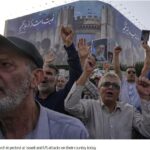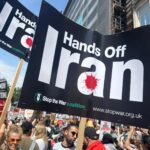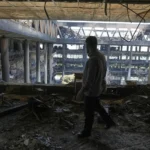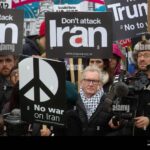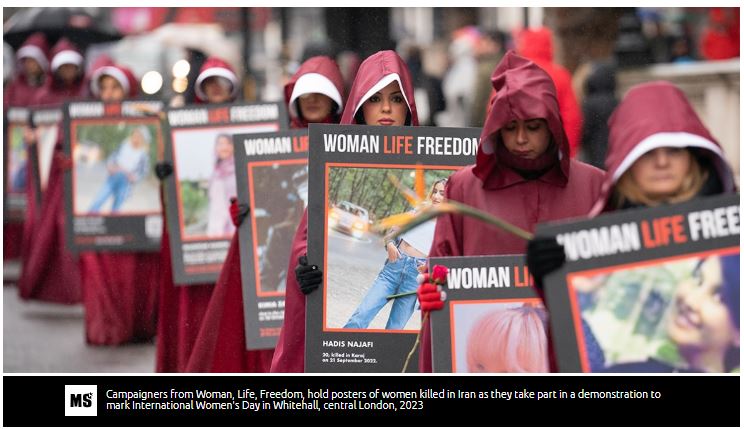
In protest against the corrupt ruling dictatorship, the left is rejecting the sham parliamentary and Assembly of Experts elections taking place in Iran today. NAVID SHOMALI of the Tudeh Party of Iran explains why Iranian communists have called for a boycott of the poll
THERE are reasons to believe that the polling stations in Iran will remain quiet today. Almost all independent, progressive, reform-minded forces in Iran — essentially those to the left of centre — have confirmed that they will refuse to participate in today’s parliamentary show.
More than a year since the massive protests of women and youth against the killing of Mahsa Amini (a young Iranian woman, murdered in the headquarters of the “morality police”) shook Iran, people are set to take the world by surprise.
International media agencies have dispatched their journalists to Tehran ahead of the anticipated showdown.
A recent opinion poll of almost 16,000 Iranians across 31 provinces, organised by the regime’s Ministry of Culture and Islamic Guidance, reveals that a major shift in attitude towards Iran’s theocracy has occurred since the 2022 “Woman, Life, Freedom” uprising. It showed that almost three-quarters of Iranians (73 per cent) want a secular government rather than a theocratic dictatorship.
But there will not be a violent clash with the security forces, government mobilised militia and police. People will simply exercise their right not to leave their homes and so avoid being dragged forcibly into a polling station by pro-regime mobs.
Given that all other protests in recent years have been set upon by the security forces with many injured, imprisoned, and murdered, this time people will desert the polling stations.
People are rightly angry that the elections lack any veneer of democracy as no opposition candidates are allowed onto the ballot papers.
According to a report by the Ministry of the Interior, only 52 per cent of applicants were approved to stand by the vetting process.
Would-be candidates who were rejected were notified via text message from the “National Elections Headquarters” on January 5.
Roughly 38 per cent of all applicants were not approved on political grounds, while less than 10 per cent failed the mandatory eligibility tests.
The extent of disqualification of candidates by Assembly of Experts was such that it even provoked the former president and loyal servant of the regime, Hassan Rouhani, to openly protest.
Rouhani, president of the theocratic regime for two terms from June 2013 to 2021 and representative of the supreme leader in the National Security Council for many years, was himself rejected.
He was barred from contesting in the elections for a seat in the Assembly of Experts (AoE), a clerical body which operates as a second higher chamber.
In a letter to the assembly, Rouhani wrote: “Those who disqualified me with political motives, and also disqualified thousands of candidates of the Islamic parliament elections for mainly political reasons, and deprived people of their right to participate in the elections, are neither the owners of the revolution nor of the country.
“Neither do they have the competence to determine where the interests of the country lie nor to disqualify the loyal and compassionate servants of the country.”
Rouhani has, of course, conveniently forgotten that those responsible for vetting the candidates have been installed by the supreme leader and that when it was deemed necessary to remove his rivals from past election campaigns, they obliged so that he could take up the presidency unopposed.
In a statement released by the central committee of the Tudeh Party of Iran last week, the oldest political party in the country called on the workers, women and youth of the country to boycott the elections: “45 years after the victory of the February 1979 revolution, not only have our people been denied freedom and social justice but also they have had a dictatorial regime based on the moribund and deeply unpopular ideas of ‘political Islam’ imposed on them, the policies of which neatly align with the country’s big capitalist interests. As a result, the huge gap between rich and poor has now reached unprecedented dimensions in our country.”
The statement further elaborated the objective and subjective conditions in Iran:
“The objective and subjective background to the popular protests of 2017-18 and 2019-20; the strikes of workers, pensioners, teachers; the protests of the oppressed masses; the vital campaign of environmental activists; and then the ‘Woman, Life, Freedom’ movement in 2022 that seriously challenged the supreme leader’s regime, is the fire under the tinder of discontent of the masses in Iran — the flames of which will inevitably flare up again sooner or later.
“We have seen the sparks flying throughout the workers’ protests in recent weeks, as well as the courageous and steadfast protests of women, pensioners, teachers, nurses, young people, bankrupt small-scale investors, and the families of murdered or imprisoned political activists especially imprisoned women.”
The Tudeh Party of Iran argues that “for many years now, the nature of the Islamic Republic regime has been firmly established as a capitalist system with economic policies based on neoliberalism that prioritise the interests of the country’s big commercial and bureaucratic capital.
“All the macroeconomic policies of the regime, which are regulated by the office of the supreme leader and dictated to the government administration installed under him, have reflected the approved and prescribed policies of the global capitalist institutions such as the International Monetary Fund and the World Bank.”
The Tudeh Party of Iran believes that the widespread boycott of the elections will amount to yet another resounding “NO!” from our people to tyranny and theocratic dictatorship, as well as a rebuff to the incompetent leaders who have forced our country into such a critical and difficult situation.
Alongside the unified boycott of these elections, effective and co-ordinated measures should be organised against the dictatorship’s institutions, such as protests and a nationwide campaign.
We are call upon all patriotic and freedom-loving forces of the country to converge in a joint struggle in order to realise this important work and defeat the theocratic regime’s show elections and we declare our readiness to actively participate in such an endeavour.
The Tudeh Party of Iran emphasises that the time is now. As a salient example of the general mood in the country; in a recent protest demonstration in the southwestern city of Ahvaz, 3,000 striking steelworkers — along with thousands more supporters from the wider public — expressed their anger at the regime’s contemptuous treatment of the country’s poor and working people. Their core slogan read: “We have not seen justice therefore we are not going to vote!”




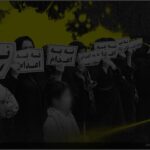


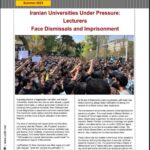
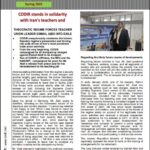




 Posted in
Posted in 
